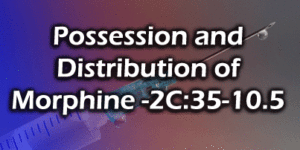Possession and Distribution of Morphine – 2C:35-10.5
Mount Olive Possession and Distribution of Morphine Lawyer
Drug Charges Defense Attorneys in Morris County, New Jersey
Morphine is an opioid narcotic used in the treatment of severe pain. It occurs naturally in the opium poppy and has a long history of human use by medical practitioners and for recreational drug use. The prosecutors of New Jersey zealously prosecute Possession and Distribution of Morphine to the full extent of the law.
The NJ drug charges defense attorneys at the Tormey Law Firm have successfully handled thousands of cases in New Jersey, in Superior Courts and Municipal Courts. One of the firm’s partners, Christopher Perry, was named a Rising Star by SuperLawyers in the area of criminal defense. Travis J. Tormey, the firm’s founding partner, has extensive experience representing clients charged with drug offenses, including Possession of Morphine, Possession of Synthetic Marijuana, Driving under the Influence of Drugs (DUI), and Possession of CDS in a Motor Vehicle. If you are facing morphine charges in Mount Olive, Parsippany, Morristown, Rockaway, Denville, or elsewhere in Morris County or New Jersey, the experienced prescription drug defense lawyers at the Tormey Law Firm are available immediately to assist you. Simply call (908) 336-5008 for a cost-free consultation.
Morphine Charges in New Jersey
Morphine is commonly known through brand names such as “MS Contin,” “Oramorph,” “Roxanol,” “Avinza,” or “Kapanol.” On the streets it is referred to as “M,” “Miss Emma,” “Monkey,” “Roxanol,” or “White Stuff.” Morphine can be administered in the form of a tablet, syrup, injection or as a suppository. Depending on its form, morphine may be injected, swallowed, or even smoked.
In New Jersey, it is illegal to carry prescription drugs and certain medications unless you hold a valid prescription. Under N.J.S.A. 2C:35-10.5, possession and/or distribution of morphine is prohibited unless carried out by a licensed physician, dentist, veterinarian, or pharmacist. As set forth by the Controlled Substance Act, morphine can be classified as either a Schedule II or Schedule III controlled dangerous substance (CDS), depending on the dosage. Pure morphine or morphine products with more than 50mg per 100g are Schedule II substances, while products with a non-narcotic medication added are Schedule III substances. Schedule II drugs have an accepted medical use but a high potential for abuse that can lead to physical and psychological dependence. Schedule II drugs are the most powerful drugs which can be legally prescribed in the United States.
The penalties for possession or distribution of morphine vary, depending on the number of pills that are seized.
Second Degree Morphine Possession, Possession with Intent to Distribute, Distribution
The most serious charge is second degree intent to distribute morphine. This is typically the charge if the offender possesses 100 or more units or morphine. If convicted of this charge, an offender faces five (5) to 10 years in NJ State Prison, with a presumption of incarceration. Additionally, a conviction can result in the imposition of a $300,000 fine.
Third Degree Morphine Possession, Possession with Intent to Distribute, Distribution
In New Jersey, possession of between five (5) and 99 morphine units without a valid prescription is classified as a third degree crime. If convicted of third degree possession of morphine, you can be sentenced to between three (3) and five (5) years in state prison and fined up to $200,000.
Fourth Degree Morphine Possession, Possession with Intent to Distribute, Distribution
If you are caught in possession of four (4) or fewer units of morphine, it is considered a fourth degree felony. This can be punishable by up to 18 months in New Jersey State Prison.
Disorderly Persons Offense: Morphine Possession
As set forth by N.J.S.A. 2C:35-24, possession of four (4) or fewer units is a disorderly persons offense. This essentially means that if you are caught with even a single unit of morphine outside the bottle or container in which it was dispensed, you could be charged with disorderly persons possession of morphine. Beyond that, simply being under the influence of morphine in public without a valid prescription can be a disorderly persons offense. If convicted of this charge, you face up to six (6) months in the county jail and a fine of up to $1,000.
Disorderly Persons Offense: Failure to Turn Over Morphine to a Police Officer
Another related charge is failure to turn over morphine to a law enforcement officer. As set forth by N.J.S.A. 2C:35-10(c), failing to turn over a controlled dangerous substance (CDS) to police is a disorderly persons offense. It is not uncommon for prosecutors to use this as a downgraded charge in a morphine case. If convicted of this charge, you could face up to six (6) months in the county jail, a $1,000 fine, and suspension of your driver’s license for a minimum of six (6) months.
Contact a Morris Township Morphine Charges Defense Lawyer for Immediate Assistance
If you are facing charges for Possessing, Possessing With the Intent to Distribute, or Distribution of Morphine, there can be serious consequences associated with a conviction, including jail time and hefty fines. Do not delay in hiring legal representation. Protect your freedom and your rights. There are defenses available to a Morphine charge. Our New Jersey prescription drug defense lawyers are prepared to examine the circumstances of your arrest and undermine the validity of the search. If the search was conducted illegally, then the entire case against you could be thrown out. Additionally, if you are facing Morphine charges in New Jersey, you may be eligible for a diversionary program such as the Pre-Trial Intervention (PTI) program or the conditional discharge program, depending on your prior record and the degree of your charges. The Morris County drug charges attorneys at the Tormey Law Firm are available anytime to discuss your case. Contact us now at (908) 336-5008 or you can use the online contact form to get your free case evaluation.


